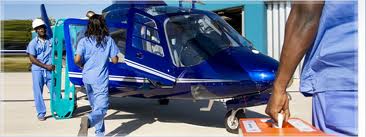Like a story out of an inspirational novel,Ola Orekunrin was studying to become a doctor in the UK a few years ago when her younger sister fell seriously ill while traveling in Nigeria. The 12-year-old girl, who came to Nigeria on holiday with relatives, needed urgent care but the nearest hospital couldn’t deal with her condition.
Miss Orekunrin and her family immediately began looking for an air ambulance service to rapidly transport the girl, a sickle cell sufferer, to a more suitable healthcare facility. At that time, she and members of her family searched country wide and found none, in fact the closest centre was several hours away in South Africa.
“It was really a devastating time for me and I started thinking about whether I should be in England talking about healthcare in Nigeria, or I should be in Nigeria dealing with healthcare and trying to do something about it.”
Orekunrin did the latter. Motivated by the tragic death of her sister, the young doctor decided to leave behind a high-flying job in the UK to take to the Nigerian skies and address the vital issue of urgent healthcare in Africa’s most populous country.
A pioneering entrepreneur with an eye for opportunity, Orekunrin set up Flying Doctors Nigeria, the first air ambulance service in West Africa, transporting victims of medical emergencies, including industrial workers from the country’s booming oil and gas sector.
“There was a situation in Nigeria where there were only two or three very good hospitals and they were sometimes a two, three, four-day journey away from the places where incidents happened,” says Orekunrin.
“We also have a huge oil and gas industry and at that time there was no coordinated system for moving people from the offshore environment to a hospital to receive treatment.”
We save lives by moving these patients and providing a high level of care en route.
Ola Orekunrin, Flying Doctors Nigeria
After almost 3 years of operations, the flying doctors have airlifted at least 500 patients from remote locations to hospitals to obtain critical health care utilizing helicopters and small airplanes..
“From patients with road traffic trauma, to bomb blast injuries to gunshot wounds, we save lives by moving these patients and providing a high level of care en route,” says Orekunrin.
It is no news for anyone living in Nigeria, that most of our roads are nothing more than death traps, more and more people die on the roads yearly than the combined deaths caused by Islamic extreme sect member (boka haram). So when I hear stories like this, of young Nigerians doing things to improve the society, it gladdens my heart.
At 27, there isn’t much Orekunrin hasn’t achieved within her field, we have young Nigerian doing things worthy of mention and such people haven’t even been nominated for national awards, whereas we have Nigerian’s who all through their careers have done nothing but rape the country’s wealth and yet such individual have gotten multiple national awards.
Born in London, at age 21, Orekunrin had already graduated from the University of York as a qualified doctor. She was then awarded the MEXT Japanese Government Scholarship and moved to Japan to conduct research in the field of regenerative medicine.
I wanted to facilitate getting the right patient, to the right facility, within the right time frame for that particular illness.
Ola Orekunrin, Flying Doctors Nigeria
After moving back to Europe the young doctor looked set for a promising career in medicine in the UK. But her desire to improve healthcare services in West Africa brought her back to her roots.
Orekunrin quit her job, sold her assets and went on to study evacuation models and air ambulance services in other developing countries before launching her ambitious venture, which enables her to combine her “deep love for medicine and Nigeria” with her growing passion for flying — Orekunrin is also a also a trainee helicopter pilot.
Her believe is that “Eighty percent of the world trauma occurs in low-middle income countries just like Nigeria,” she says. “I feel there should be more focus on the trauma epidemic that Africa currently faces.”
With young Nigerian’s like this doing what they love and serving humanity in the process, there is certainly a bright future ahead for Nigeria

